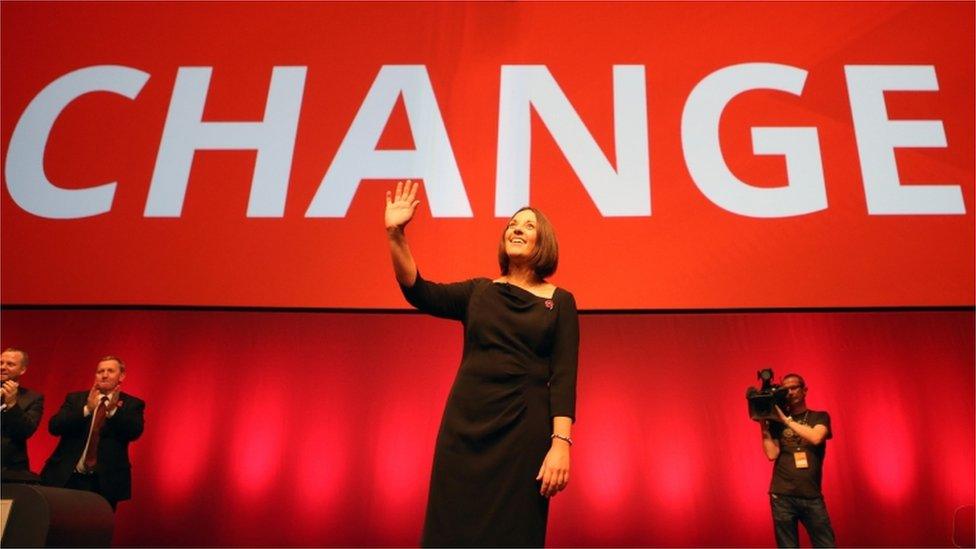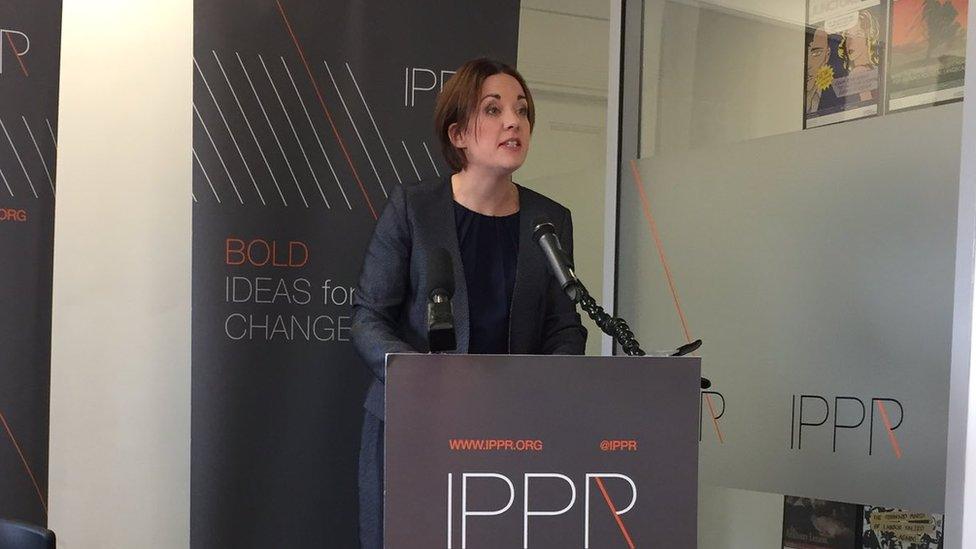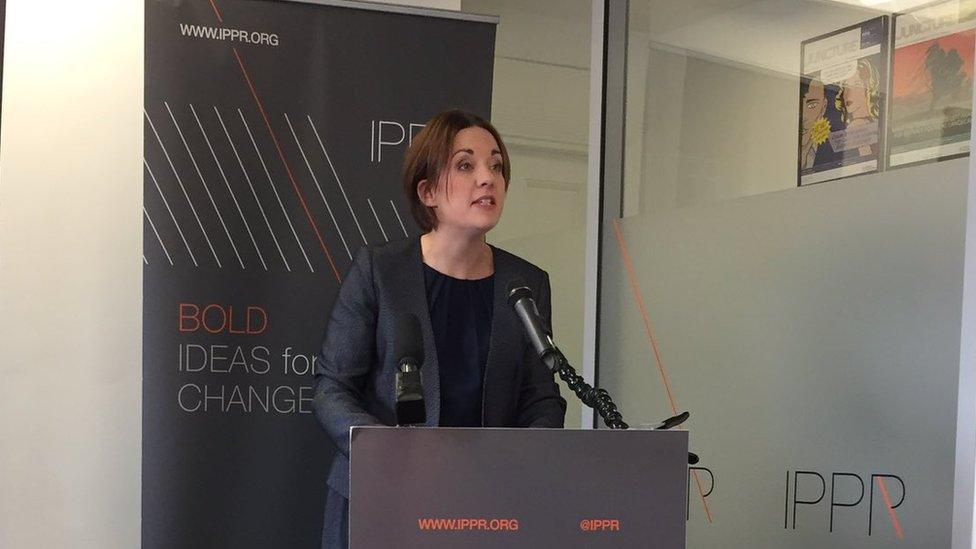Labouring over the 'Scottish Question'
- Published

Ms Dugdale hopes she can be the one to finally settle Scottish Labour's constitutional questions
For years, frankly for decades, Labour has wrestled somewhat uncomfortably with the Scottish Question. Initially, with the concept of devolution, more recently with its consequences.
For years, frankly for decades, Labour leaders - either from Scotland or Westminster - would seek to project their "issue of the day" at public events north of the border.
For years, frankly for decades, we in the wicked media would pursue those self-same leaders on the topic of Home Rule. It's part of our charm.
In this regard, one thinks of Jim Murphy, normally the most placid of individuals (except on the football field, as I could previously attest).
During one UK general election campaign, I remember Mr Murphy chiding the w. media fairly robustly for, in his view, "obsessing" about the question of the constitution.
I remember Alastair Campbell, Tony Blair's doctor of spin, passing me a note during a Labour event in Glasgow, mischievously drawing my attention to the fact that the questions from the audience were about domestic policy, not devolution.
'Parish council'
One thinks of T. Blair himself landing in unwarranted trouble when the w. media suggested that he had compared the proposed Scottish Parliament to a parish council. He had done nothing of the kind. He had contrasted the two, suggesting that it would be invidious if Scotland's powerful parliament were to be denied the fiscal clout currently available to the humblest level of local administration in England.
One thinks, from an earlier era, of Neil Kinnock being interviewed by my estimable colleague and chum Kirsty Wark. Kirsty wondered why Mr K's Scottish conference speech had contained no reference to devolution.
Mr Kinnock, less than pleased, replied that he had not mentioned "environmental conditions in the Himalayas" either.

Former Labour figures including Neil Kinnock, Tony Blair and Jim Murphy all pondered the constitution
In essence, Labour's problem was that constitutional change was not the party's core agenda. Not truly, madly, deeply. Labour politicians wanted to talk about social justice, about redistribution, about socialism, if they were feeling particularly bold.
They found however that the persistent fault line in Scottish politics remained the constitution - or, more precisely, the offer of independence. Driven, of course, by one of Labour's chief rivals, the SNP. Driven, thus, from a Labour perspective, externally.
This remained the case even as Labour worked within the Constitutional Convention to draft a detailed scheme of devolution. It remained the case even as a Labour UK government enacted that scheme and recreated a Scottish Parliament.
Successive Labour leaders - perhaps most particularly Johann Lamont - wanted to still the constitutional clanjamfrie. To be adamantly clear, this was not opposition to self-government. It was a sense that the new structures must be put to work in line with Labour ambitions and aims.
'Power for a purpose'
It was said that constitutional issues are second order. Which they can be, to some extent, in that, in a peaceful country free from tyranny, the people generally fret primarily about jobs, law and order, health and the rest.
That does not mean - it never meant - that constitutional issues are low-ranking in importance. Indeed, they may gain primacy at particular periods - and are often important precursors in the public mind to other decisions about individual policies. Power for a purpose.
People may say, for example, that they want improved education and health provision - and that they believe this may come about through the conduit of a particular constitutional structure or reform.

Kezia Dugdale laid out her vision of a federal UK in a speech in London
Which brings me to today. (Who said "about time"? Take that person's name.) Scottish Labour leader Kezia Dugdale has delivered a speech in London in which she attempts to set out a new constitutional offer, for Scotland and the wider UK.
Kezia Dugdale is one of those successive Scottish Labour leaders - and there has been quite a list - who have struggled with the constitution.
A new narrative
Most particularly, she has sought to project a new narrative in a political climate where her party was palpably shedding power.
Scottish Labour found itself outflanked. Firstly, it was ousted as Scotland's leading party by the SNP, unable to compete with the Nationalist offer to "stand up for Scotland".
Then Labour lost its standing as the principal opposition party at Holyrood to the resurgent Tories who had gained new strength from supporting, without quibble or qualm, the unalloyed Union. With that offer, they contrived to corral a substantial chunk of the No vote from September 2014.
Ms Dugdale's answer is a People's Convention for the entire UK, with the objective of adding English regionalism to existing devolution. In short, a form of federal UK.
She also wants new powers for a purpose devolved to Scotland - such as employment and the minimum wage. This would marry with the Labour ambition of blending social justice with constitutional reform.
Substantial scepticism
There is, it should be said, substantial scepticism about this initiative among Labour's rivals at Holyrood. The SNP say that it scarcely sits with their experience of Labour thwarting previous initiatives to bring new powers. The Conservatives say that it represents more unwarranted "upheaval".
Then there is the small question of implementation. Is Jeremy Corbyn bought in to the package? Yes, in that he has previously endorsed a convention. No, in that it is not presently UK Labour policy?
However, as Labour knows only too well, the party is currently rather remote from power at both Holyrood and Westminster. That means today's initiative is more about strategy than immediate policy.
Ms Dugdale wants a card which gives her a place at the table. She wants a narrative of her own, not a pallid reflection of nationalism, which he party continues to contest, nor standing as an undiluted unionist, a term which some in Labour disavow because of its Northern Ireland connotations.
But are voters prepared to give her a hearing?
- Published7 December 2016
